
Study Smart
To stay on top of uni work, you’ll need to study smart.
The workload at uni is more demanding than at school.
To stay on top of it, you’ll need to hone your time management, active reading and listening, note-taking, and exam prep techniques.
These techniques work together to make uni more manageable. Active reading and listening help you take great notes, great notes help you study for exams, and managing your time means you can prioritise what matters most (including breaks from study!)
Try different study techniques to see what works for you, and what works for different courses.
Remember, there are many resources available at uni to help with study skills as well, so make sure you check them out when you enrol.
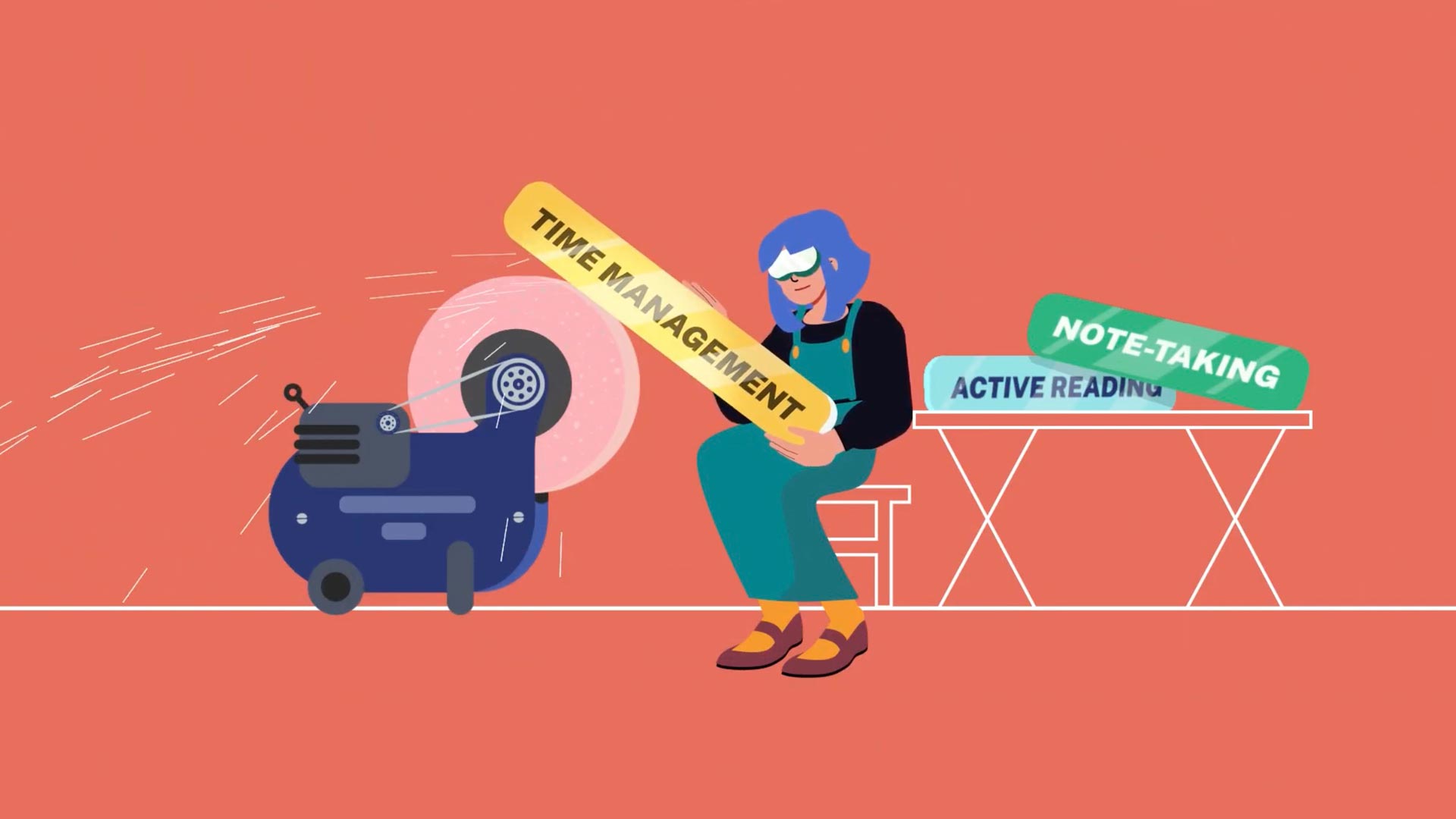
Let’s delve into study strategies to help you succeed at uni.
At university, you may find there is a greater workload than at high school, depending on how many units you take. For instance, for many subjects you’ll be expected to read multiple sources to prepare for class each week.
To master a greater workload, you’ll want to further hone your study strategies like time management, active reading, and effective note-taking.
There are many strategies that can support you with your studies. Some may work better for some subjects or for some people. You’ll need to try them out to see what works best for you.
At uni you’ll likely need to manage your time across attending classes, completing assessments, preparing for exams, attending social events, work, and taking care of your well-being.
One example of an effective time management technique is time-blocking, which involves dividing your day into specific blocks of time dedicated to different tasks or activities. This can boost your focus and ensure that essential activities receive the attention they deserve.
When tackling your readings in preparation for classes or assessments, you’ll need to read actively.
Instead of skimming through the material, highlight important points, take notes, ask yourself questions about the material, summarise critical information, visualise concepts, and actively search for answers to any questions while you read.
To help you understand and remember key information for exams and assessments, you’ll need a good note-taking system.
A popular note-taking method is the Cornell method, which divides your paper into three sections: a narrow left-hand column for cues or keywords, a wider right-hand column for lecture or reading notes, and a bottom section for summarising main points.
This approach encourages active engagement, organisation, and efficient review with clear study cues.
Seek, find and practice the study skills that work best for you and remember you’ll have many resources at university to support your study skills development.

Tahrima, Bachelor of Politics, Philosophy and Economics/Law
Uni doesn’t stop once you leave the campus. Uni continues throughout your whole week. So that’s definitely a really big commitment, especially whilst being a full time student. On top of that, I also work part time. So trying to juggle uni and part time work is obviously super fun and even just making time after all of that to see friends, to go to the gym, to make time for family. They’re all commitments that you don’t realise are important to you until you have to make a schedule where you’re committing to all of those things. I think in terms of managing my time, what I find to be most effective is kind of making to-do lists so figuring out the task that I need to do for that day. It kind of gives me some direction but I also am a bit crazy and I like to make very specific by-the-hour blocks of what I need to be doing and I know a lot of people don’t like to be restricted like that and that’s perfectly fine, but that works for me because it kind of keeps me accountable. So Google Calendar is my best friend. Making different calendars for different things like for example, things like when I get paid or when I have work, what my work schedule is like, as well as what uni readings that I need to do when my classes are, what time I’d like to go to the gym. Things like that. So it’s all in different calendars so I can kind of click in and out of it so my calendar doesn’t look way too busy but also I have everything on there. Google calendar is something I’d highly recommend. It’s super user friendly. You can have it on your phone as well as your laptop so I like to be able to, you know, look through it whenever I need to, whether that be on the train or even if I’m in class and I need to put something down like reading that I need to do or something that lecturer mentioned that I should add into my notes. I also like a reminders app. It’s really great, even a thing on Apple. That’s just personally what I use or even Google Keep if you’re not an Apple user. I’d highly recommend that just because you can write down what you need to do, make a to-do list, check it off if you’ve finished it. I find that sometimes in a week, I might have up to 60 pages of readings for all my readings combined and I know it sounds like a lot but trust me, you get through is pretty quickly or you understand it pretty well, if you find time in your schedule to really sit down and do it. So what I mean is blocking off maybe an hour or two to just sit down and do the readings. I think my biggest piece of advice with time management especially with someone who’s like me and likes, you know, blocking off time to the hour, to the minute, to the second, if they could, is that sometimes things don’t go according to plan in regards to time management. I found that before I’d come into uni, some days I’d say, “okay, after this lecture,” “after having lunch, I’ll definitely want to get an hour of study done.” But then I see a friend after lunch and we just get to chatting and get to catching up and that studying just goes away and that’s perfectly fine. Just make sure you’re doing it at a moderate rate so if you have an exam coming up or an assignment coming up, you’ll probably need that hour of study but if you’re on campus and it’s just, you know, Week 3 or Week 4. It’s just a random week during the term, then it’s perfectly fine to spend that hour catching up with friends if you need to.
Ethan, Bachelor of Engineering (Honours)/Master of Biomedical Engineering
So my first time management strategy in university was simply writing out all of my goals and trying to complete them maybe in the first two days of university. And that way I have a complete break of university for the rest of the week. And that wasn’t really the best strategy because as my work piled up, I found myself not being able complete those goals by the first two days of the week and having the rest of the week to do whatever I’d like and having that guilt of not being able to complete my goals really really shunted my workflow for the rest of the week. So learning from that experience in first year, my goal is to now still set up a list, but I break it up into goals over the week. And not only that, I also separate into goals where what other goals where the best version of myself can achieve and what’s the self-goals that the worst version of myself can achieve? So it’s a combination of the workload from multiple courses as well as other commitments from extracurricular activities and interpersonal relationships really pushes you to make sure your time management is on point and make sure you can really excel at each of these activities and make sure you’re having the best time. So a specific tool I use to oversee my time management is definitely keeping a small journal. So I definitely write in a journal every morning. These are the goals I want to set out for myself. What am I going to do? How am I going to achieve them? And what’s the minimum version I want to achieve? So make sure I’m still on track even though I don’t achieve as much. So journaling, keeping a daily journal, writing your thoughts down is definitely helpful. So as an Engineering student, you have a lot of different assignments and a lot different content to study so being able to break it down into multiple categories really pushes you to make sure you have the good time management. So in a day in life of an Engineering student, there’s a distinction between a learning content, applying that content, and doing projects. So being able to effectively allocate your time for each of those phases of the learning process and development process is definitely important for an Engineering student. So for example, if you’re planning to make a project like a physical project using 3D printing for example, you gotta spend time coming up with the design of the product, actually making it, and then doing the finishing touches, and I don’t know, making a document or report about it. So understanding that you have those four processes, you gotta make sure you have enough time to allocate and really make sure each step is fully maximised.
Daphne, Bachelor of Psychology (Honours)
So time management in university is definitely different to high school so in terms of your classes aren’t structured on a fixed timetable. You might in high school, you might start at 9am and finish at 3 pm for five days a week. At university, it’s completely different. The timetable is really flexible in terms of what you want to do and what’s flexible for you. So if you live far away from a campus, you might want to start maybe a little later in the day. If you live closer to campus, you might want to start a little early in the day. So in my first year, I did a lot of the physical notes in terms of blocking out my time. But then I found that it wasn’t as flexible for me. So I moved to digital and using an online calendar app in terms of planning out my day. And that was way easier for me because I could easily delete events without having to erase it or like white it out. I could delete events. I could like send my information to other people, like “hey, here are the times I’m free. Can you get back to me when you’re free?” and things like that so it’s much more easier to organise time that way. But again, completely up to you if physical works and you like to write things down, that’s fine. Digital is just easier for me, I found.
Eamonn, Bachelor of Engineering (Honours) (Software)
I realised that time management was really really important at university when my assignment was due in two days, and I hadn’t particularly started yet. It was very much all on me. It was my fault that had happened. But I think it can come as a really big shock to a lot of people that when you’re in an environment that is so independent, that requires you to go and do all of the work, and you to go and manage your time, it can come as a really rude shock to a lot of people. Time management at university is a lot harder than it is in high school. I think a lot of it really comes down to the fact that university is so self-driven and requires you to go and essentially look after yourself. You’re never going to go and get the teachers telling you to go and submit your assignments soon or to go remind you of how late it’s going to be due. Because at university, a lot of the time, you’re only really seeing your cohort or your lecturers or like maybe even just once or twice a week. In high school, using calendars and using student diaries, all of that never personally worked for me. It never made sense to actually go and use it. But in university, when you’ve got six different assignments to keep track of, three different social events that you want to go to, right? It’s so much more useful in this sort of context where because you’re managing all of the things that you want to go and keep track of, rather than just the English assignments that your teachers are telling you to go and submit. It becomes so much more useful and easy to go and keep track of the things that actually matter to you. A lot of people kind of drag the kind of same system of how they learned in high school to university and a lot of the times, that never quite works for them. The thing that I would go and tell my first-year self about time management is to of course, just be willing to experiment. I was the person who had to go through that kind of journey of self-discovery, of trying to go and make myself understand that the strategies that I had in Year 12 that carried me through the HSC weren’t going to work for university. Not when, you know, I’ve got so many other responsibilities of becoming an adult that, you know, the kind of constant grind of being able to go and study, you know, 12 hours a day. That wasn’t really available to me anymore so it’s being able to go and experience to go and find out what kind of strategies work for me best now that I’m in a completely different context.
Time Management
“Uni doesn’t stop when you leave the campus, uni continues throughout your whole week” – Tahrima
We’ve all got 24 hours in a day, but our minds all work in different ways and we all have different commitments and priorities.
Time management at uni is about finding what works for you to make the most out of your 24 hours, juggling classes, uni work and life.
Try out some of our favourite techniques below and see what works best for you!
What is time blocking?
Time blocking means blocking out time across the week for the things you know you need to spend time on.
The pros
- It helps to focus on one thing at a time, which makes you more productive and feel less overwhelmed.
- It helps with procrastination – no more putting that assessment off!
- It ensures important tasks are given the time they deserve (in other words, a great way to prioritise)
How does it work?
- Start with the non-negotiables: Each week starts with a schedule with your weekly commitments mapped out, like classes, work and family dinners. Add in anything you’ve already got planned for the week, like movies with friends on Tuesday night.
- Deadlines and priorities: Add in any uni deadlines you have for the week and what uni work you need to get done (e.g. Finish draft intro for PSYC1001 report, Submit CHEM1101 quiz by Friday midnight)
- Block time: With your deadlines and priorities in mind, block out the time you have available for study for specific tasks (eg Readings for LAWS1203, Working on the draft intro for PSYC1001 report). Time blocks can be short or long, depending on the task.
- Minimise distractions: During each time block, focus just on the designated task. Minimise distractions and interruptions as much as possible.
- Transition time: Allow for short breaks or transition periods between time blocks to rest, refocus, or switch gears if necessary.
- Mix it up: While time blocking provides structure, you need flexibility too. Unplanned responsibilities will come up that you’ll need to prioritise and sometimes you won’t be in the right headspace for what you’ve planned.
- Build in breaks: Be realistic. We all need proper breaks when we are studying. Go for a walk, eat something, watch one episode.
- Reflect: At the end of the day or week, review how well you adhered to your time blocks and adjust your scheduling and priorities if needed for future planning.
What is the ‘pomodoro technique’?
The Pomodoro Technique involves working in 25-minute intervals followed by a 5-minute break. After four rounds, you then take an extended break.
The pros
- Improves productivity by structuring your work and scheduling regular breaks
- Useful for work that requires focus and when you need to reduce distractions (e.g. writing an essay or studying for an exam)
- Pro tip: Get rid of all distractions in your workspace so you can work uninterrupted for each 25-minute block. On your breaks, get up from your desk and move your body.
How does it work?
Listen to Yana, a high school student, talk about how the Pomodoro technique transformed her relationship with time management.
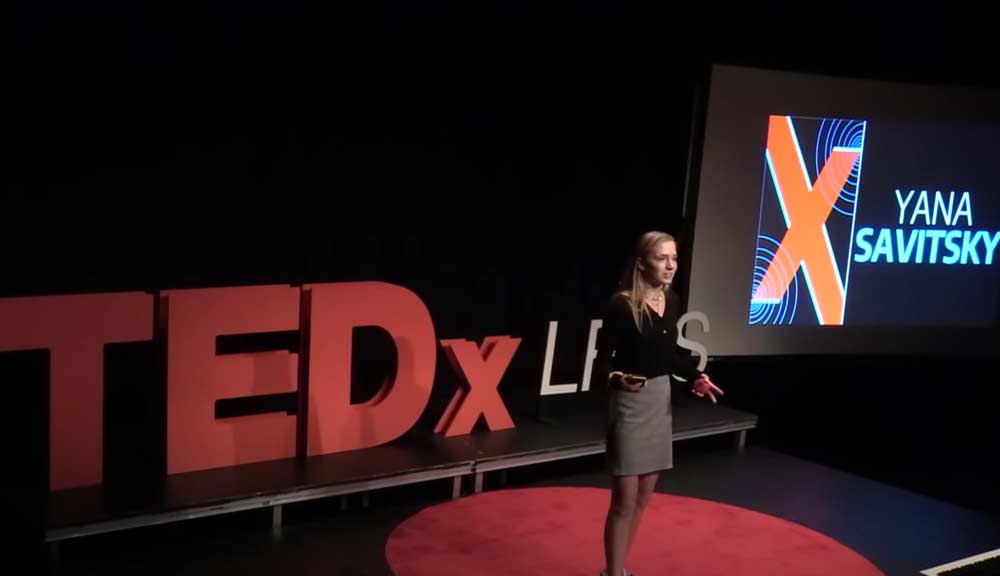
How to use calendars
Don’t be caught off-guard by a big assessment due in two days that you thought you had two weeks to study for! Put all your due dates, exams, work shifts, social events, and other commitments in a calendar so you always know what’s coming up.
Different types of calendars
If you prefer a physical calendar, keep it where you can see it (like on your desk). If you prefer a digital calendar, make sure it’s easy to access on your phone and turn on notifications.
What is task management?
Breaking down your big deadlines into manageable smaller tasks and setting timeframes and reminders helps you plan out your work and keeps you on track.
The pros
- Building a task list when you first get your assessment outline helps you plan what you need to do.
- You can set reminders for sub-tasks to keep you on track.
Digital task Lists
Try these task management apps:
- Todoist
- Notion
- Remember The Milk
- Microsoft To Do
Notetaking
“Notetaking at uni is all about studying a bit smarter rather than studying harder” – Julian
At uni you’ll need to tackle more complex content than at high school, so a good notetaking method is key to success!
Good notetaking throughout the year (not just during exam prep!) will help you understand and remember course content.
Here are some great note-taking strategies to try:
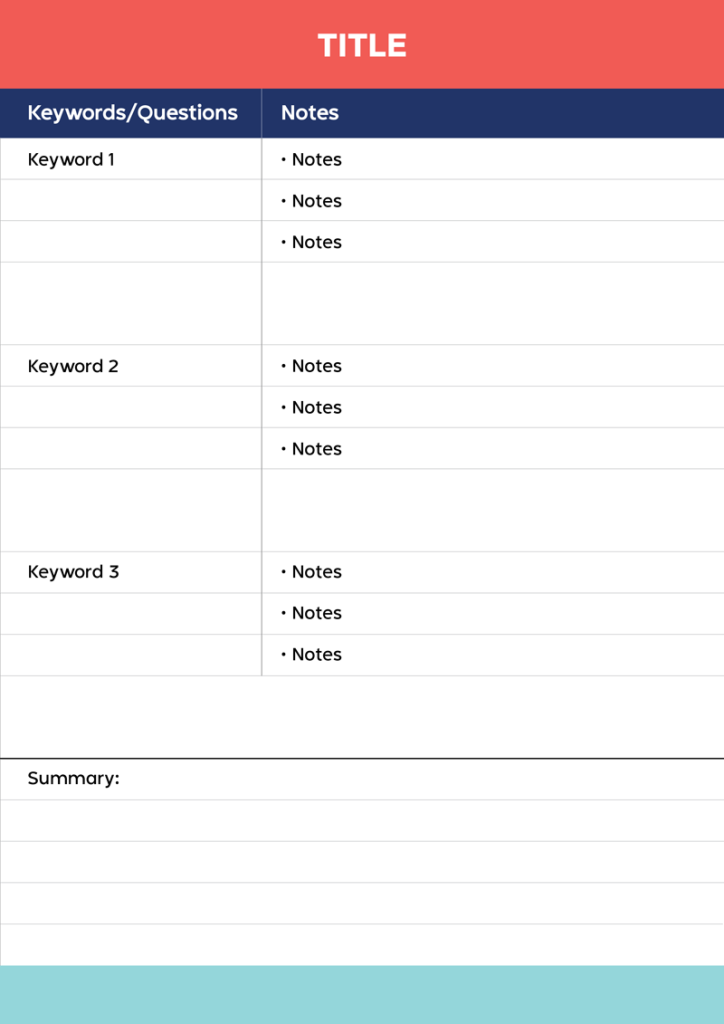
The pros
- Great for summarising and reviewing content, especially in text-heavy subjects.
- Encourages deep engagement with the content.
- Ideal for structured review of notes before exams.
Keep in mind
- You may write and rewrite your Cornell notes, as you become more confident with the content.
Best for
- Structured review of content before exams
- Highlighting key ideas in a lecture
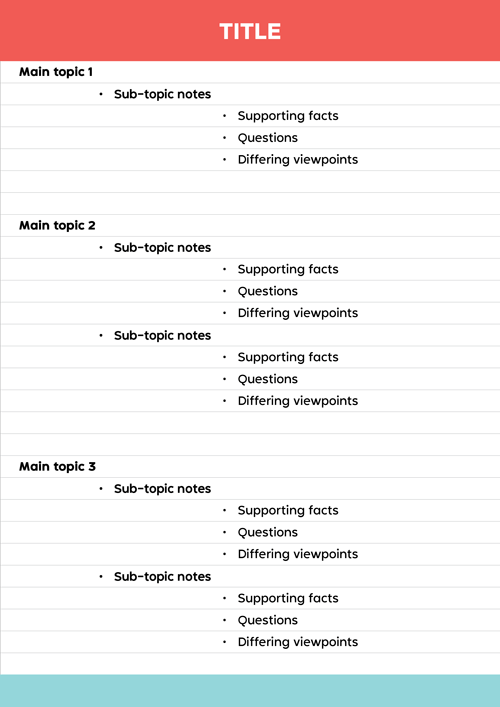
The pros
- It’s simple, quick and effective for organising ideas.
Keep in mind
- The simplicity of the Outline Method may mean it’s harder to capture more nuanced information.
- It’s text-heavy, so may be less useful where visual information is required.
Best for
- Great for note-taking during lectures or when completing readings before class.
- Subjects with well-structured and hierarchical content.
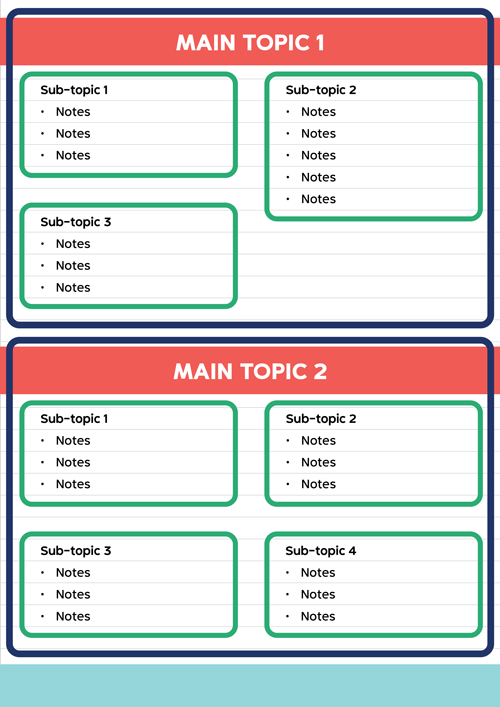
The pros
- Clearly organises information visually into boxes.
- Encourages clear and concise notes (to fit into boxes!), which means better topic understanding.
Keep in mind
- Can be time-consuming.
Best for
- Note-taking on topics you’re already familiar with.
- When you want a visual but flexible organisation for notes.
- Getting clear on a topic and discovering what areas you don’t understand so well.
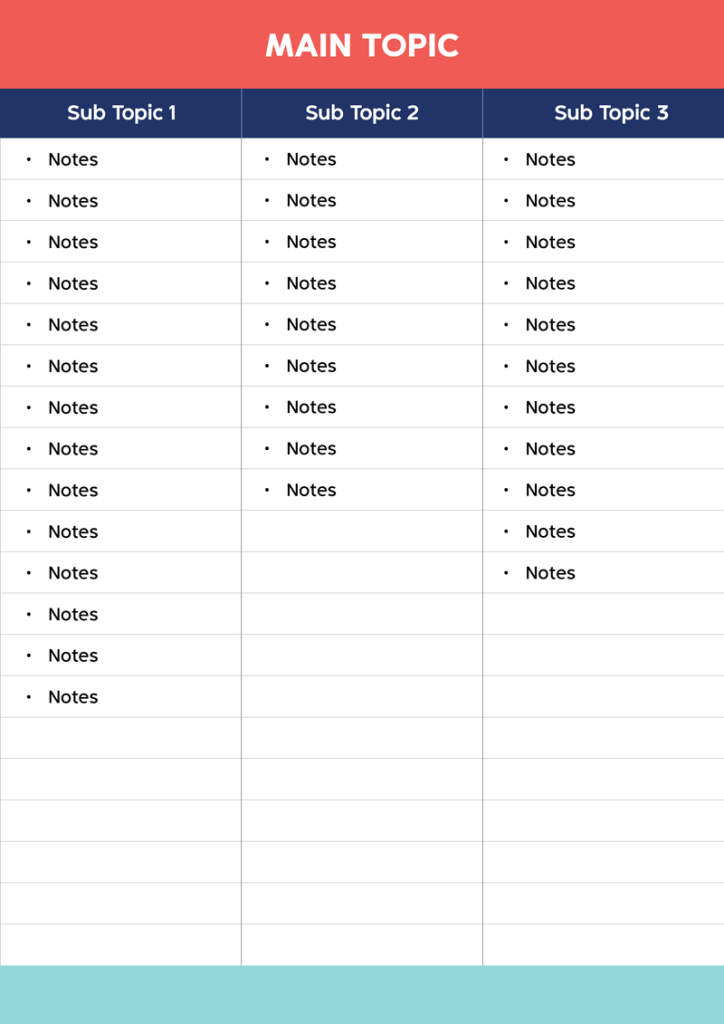
The pros
- Offers a great structure for understanding data-driven content.
Keep in mind
- It may not be useful for text-heavy topics or where the information is difficult to categorise.
Best for
- Practicing recall for quizzes or exams, especially for reviewing numerical information and statistics.
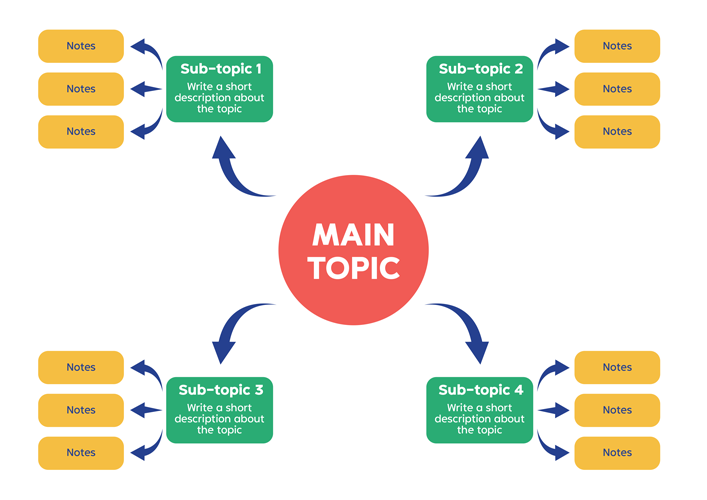
The pros
- Encourages creative representation of information, which can help bed down concepts.
- Represents the relationships between pieces of information.
Keep in mind
- It’s not well suited to note-taking for subjects where you need to remember lots of detail.
Best for
- Learning complex or abstract concepts.
- Understanding the big-picture themes or ideas in your subjects.
- Mapping out plans for assessments like essays, reports or presentations.

Julian, Bachelor of Psychology (Honours)
I originally started off in my first term trying to handwrite. I gave up on that very quickly. I’m sure it still works for some people in university but for me, it just felt very time consuming and my handwriting is awful so I transitioned to an app called Notion which I know quite a lot of people in high school now might use as well but the way that I use it is, I’ve always taken notes in a way where I turn them into toggle lists, which is basically just a fancy way of saying whenever I’m reading through lecture slide, I will turn it into a question. So if I’m reading something about, I don’t know, people’s decision making, I will write a question, “How do people make decisions?” and that gives me a really nice resource to look at later, instead of just passively reading through the notes. I’m always trying to self-test myself so it really helps me when exams come up to be like, “Okay, what do I really need to work on,” so that’s been the system I’ve been using for the past three years and I find that it’s been really effective for exams but another thing is, well, it’s not particularly time consuming as well. For me, that’s a nice balance of not having to spend hours and hours and hours handwriting notes or summarising things. I’ve really liked that balance between, you know, studying a bit smarter rather than studying harder and that’s the way I’ve got about my note taking in uni. In high school, I definitely took down my notes digitally most of the time too, but I would just write down the notes and leave them there and then sort of gloss over them later and I’m sure being in year 12 at the moment, you probably hear your teachers harp on about “do trial exams”, “do trial exams” all the time and sometimes, it can feel a bit like a lot of effort or it’s just a bit too much but towards the end of before I sat my HSC, I started actually sitting a lot of trial exams and I realised why they harp on about it so much because testing yourself or asking yourself questions is just the best way to make sure that you understand things. So that’s been the biggest thing for me instead of just trying to summarise or passively writing things down, really making sure that as I’m going through things, I’m asking myself lots of questions to make sure that I probably understand what’s going on. When do I use these various note taking strategies? I’d say it’d probably vary for every single degree but for me, it’s primarily in lectures so when they’re covering the content and walking you through it. In tutorials for my course, it’s often based on slides and telling you how to go about the assignment so it’s not as essential to be taking notes because that sort of separate to the final exam. The other place where I take notes is when I’m looking through an assignment and sort of getting my head around. I’ll often right down my thoughts as I’m going through it or trying to summarise things so it’s a bit more approachable for me to get stuck into it instead of this giant intimidating assignment sheets. So I’d say the two main places for me is throughout lectures and when I’m actually starting to work on an assignment and reading through it.
Audrey, Bachelor of Science (Pathology)
So in my first year, my note taking ability was pretty, pretty bad. I’m not going to lie, I was basically just writing down every single thing that I saw on my lecture slides. I wouldn’t even watch the lecture. I would go straight to the lecture slide and I would write down basically everything on each slide and I’m sure that would be helpful for like visual like tactile learners who can just write down everything and they will like memorise it. But for me, I’m a very auditory and visual learner. So for me, more diagrams and short succint notes would actually be very helpful for me and that’s what I’m doing right now in my second year. But in my first year, I was doing basically the opposite and it did not work out well for me. So my note taking strategies are actually, they’re pretty varied. I have improved a lot since my first term. I’ve been trying different kind of methods, and right now what I’m doing is the Pamodoro method where you study for 25-30 minutes and then you have a 5-minute break in between, and you do that for four sets. I feel like that really helps for me because I have a really short attention span. So when I am only studying for like 30 minutes at a time, I’m actually able to like retain more of the study that I’m doing. And that little break time is very helpful for me basically. For me, I feel like my Pomodoro method actually really helps with burnout because since you’re learning for 30 minutes at a time with 5-minute breaks in between, it’s really easy to not actually have burnout because you’re studying one bit at a time and you’re not actually doing a whole bunch at once. I feel like that’s really helpful for me because one thing that I really wanted to avoid was burnout because I see how all my friends experienced burnout, especially during HSC and that was really scary for me because it was very daunting, especially during HSC. So for me, something that I really wanted to avoid was burnout and I feel like the Pomodoro method really helps with that. When it comes to actual note taking, I find that I do it based on the syllabus notes. So I take down the syllabus notes and I go back to the lecture notes and the readings that they offer, and I answer each of the syllabus points as like a question basically. And I feel like that really helps me get a fuller understanding of what I’m actually learning. And yeah, I feel like it’s really been very helpful, especially in this year because in my first year, I did not do that, and I can definitely see the difference in my learning. I think effective note taking has really impacted the way I learn just by how much more knowledge I can retain. I think in my first year, I didn’t actually remember, I don’t remember most of it, to be honest. I don’t remember most of the things that I learnt because I was just writing down everything from the lecture notes and the slides, and I feel like it didn’t really help me learn anything, especially when it came to exams and things like that. So for me, after I found the Pomodora method and active recall and study methods like that, it really helped me retain more knowledge and it helps with my exams, my assignments, and yeah. I feel like it’s really worth putting the effort in to actually be more effective at note taking. I think for incoming students to find note taking skills that really help them. I think for them they should do a lot of trial and error, try all the different ones that you can find and find the one that really works for you. Basically, that’s what I did. I didn’t do that in my first year. I just went with what I did during HSC during lockdown, and it did not work out well for me. So after I put the time in and I did the trial and error, I did find strategies that did work for me and I feel like it’s really worth the effort to put in.
Saorise, Bachelor of Arts/Law
So comparing high school and university and how I used to take notes, I think definitely the first difference is that I used to take handwritten notes in high school. I’ve definitely changed to a laptop since I came to university, and I think you probably see a lot of people doing that as well. That just makes it a little easier for me to compile my notes and sort of get them down really quickly. I also think that I’ve sort of been very strategic with my notes in high school. I used to just write down what was written on the board and not really absorb, but I was writing down. I think here at university, I definitely take a lot of notes in lectures, and so I’m sort of listening for those key words and those things that my lecture really emphasises. And I know to note that down or hear what they want questions to be asked about. And so that’s how I’ve been really strategic. I also think in terms of note taking, I used to just take notes in class in high school, whereas I take them in class but also I have to do a lot of pre-reading for my degree. And so I’m taking a lot of notes there, highlighting when I want to ask questions about sort of clarify, and that really helps as well. And that’s how I’ve kind of evolved my note taking. For my Arts degree, I think it’s very similar to maybe high school. I’m sort of typing down those key things, and I’m definitely hearing what my lecture is saying and really emphasising those points that they’re emphasising as well. For Law, I’ve definitely got some new strategies of, a lot of the things that we do in Law are case related, so like Law cases and so I’ve got tables and they really helped me kind of clarify what sort of things I need to know and how the case sort of went out chronologically. That is really great for me. I also really love flow charts. That was something that I loved in high school and I loved drawing them and now I’m like drawing them in university as well. I think that helps, you know, make the note taking fun but also helps you solidify knowledge. I think note taking in university is really great because it means that you have more autonomy on how you learn and how you’re going to take those notes. Some people like a lot of text and some people like me really like flowcharts, so you really get to choose at university how you want to take those notes. For my Law degree, these note taking strategies have been really helpful because specifically for my degree, it’s great to know the main facts of a case so that you can apply them in your exams or to answer problem question or something like that. And so having them in a table, you’ve got your questions that you want to ask and it’s all there for you. I feel like it’s very methodological. Yeah, it makes it really easy. And similarly to flow charts, you can just ask yourself a question and sort of go down the flow chart accordingly. And that’s really good for Law specifically, because a lot of Law is like reading legislation and sort of working out what steps you need take from there. It’s really great to just trial and error. You know you have your first few years of your degree for a reason and so you can work out what has worked for you in an exam. I think it’s exciting that you get to try new things. You can also, when you’re doing group study sessions or connecting with your peers, you can say like, “Hey, what’s been working for you? Or what do you like?” And I’ve definitely picked up a lot from my peers. I didn’t come up with the table method myself, and so it’s been really great to get other people’s perspectives and opinions and what works for them and what makes it the easiest for them as well.
Eamonn, Bachelor of Engineering (Honours) (Software)
For me, note taking is probably the most useful when I’m preparing for exam. Exams are when they need you to go and essentially spit out a lot of theory because of course, they don’t have the full luxury of an entire term to go and test what you’ve actually go and learned. So it’s being able to go and have very concise knowledge of how something is done, that you can essentially go and write down and go and share to your markers.
For note taking styles, I actually found myself really inspired by a lot of the programming that I actually do. I think the biggest technique that I’d love to go and share is that it should always be indenting all of your kind of paragraphs, all of your chunks of knowledge. Sometimes I see people just go and write down lines and lines and lines of all this kind of theory and stuff that they want to go and remember and take notes on, and it just becomes like a huge block of unreadable mess. When you’re like constantly indenting so that one bit of more refined information and more details are kind of set inside the paragraph, it becomes so much more easy to go and look at because now you can just go and focus in on the detailed aspects when you need to go and find them. I think the easiest way to go and find the kind of note taking technique that works best for you is to go and experiment. You need to really go through this kind of idea and process of trying a whole lot of different things until you go and find something that actually works for you.
Sweta, Bachelor of Commerce/Law
Note taking is a very foundational part of a Commerce/Law degree, especially for the Law part because there are so many readings, so much content to get through, and it definitely helps if you’re on top of your notes in the long run for your final exam when you’re doing revision. So my strategy for the Commerce part of my degree is to write notes in the lecture slides of what the lecture talks about so that I’m not repeating the notes that I already have from the slides. And then it just helps to pay attention to what is being said instead of what is being written because you can always read over what you have in the lecture slides. I take notes throughout the whole term. I have a one master document with, sometimes it goes over 100 pages depending on the type of content we have. I take notes from lectures, from readings, from tutorials and I separate it based on the weeks. And then when it comes to my final exam. I make a revision note sheet and then it’s definitely shorter. It’s about 20 to 30 pages and it’s easier to flick through during exam and during revision time. There’s a lot to get through in a whole term with when you do three courses, for example. Having lecture notes, they’re definitely helpful, but it’s not good to rely specifically on them. Having your own notes in your own words in a way that you can understand them helps you when it comes time for revising those notes for exams. When I was in my first year, I remember having like a 200-page document, but I would have repeated dot points and then I just confused myself. I’d get frustrated but now I have shorter documents, notes are in my own words, and I understand what I have written and what I have learnt better. So definitely don’t just write everything. Even if it seems super important.
Ethan, Bachelor of Engineering (Honours)/Master of Biomedical Engineering
There’s a lot of information being delivered you all at once. So being able to effectively understand and write down the most important bits in a way you understand yourself is super important in your learning process. So the biggest difference I would say between note taking in high school and university is definitely the amount of note taking you have to take yourself. So in high school, I found that a lot of time for me, I would have notes given to me already. They’re already prepared by either teachers or any other resources and I’m able to readily access them myself. But transitioning to university, the information isn’t available in the most readily or readable source, so it really helps you to properly interpret the information yourself in a way you’d understand. So for me, a technique I like to use is preview, view and review. Where preview is consisting of looking at the content and lecture slides beforehand and really formulating a specific goal or objective in mind in what I want to learn or what I want to achieve and running out what potential questions I might have. The view stage is when you actually attend the lecture or the class in person, have all your questions answered and develop a more fundamental understanding of the content. And lastly, there’s review where you fully master your understanding when you answer questions or go to the lecture or after the class to get your additional questions answered. For me, note taking occurs throughout my entire study process where it be for lecture, tutorials, for exam preparation. I’m always writing down my thoughts and notes to make sure I can use it again in the future because who knows, maybe the smallest thought or detail you might have might come up in an exam and you don’t want to regret not having writing it down so you can’t recall it later in the future. So for note taking, finding a method or technique that best suits you is definitely up to trial and error. That’s what I believe. So going from first year to third year, I definitely went through my fair share of note taking, whether it be having a friend help me. So having a bunch of friends collaborate on the same document and cluster it all together. That definitely help with time management but a big difference for me or a big challenge for me to overcome with that type of technique was that my understanding of content would not always be the same as the understanding of my peers. So even though we’re saving time just breaking down the notes together, I might have to like find myself taking even more time to interpret what other people are thinking. So that sort of links back to independent learning where your own understanding is really the best understanding you can have.

Audrey, Bachelor of Science (Pathology)
So, active reading really helps me with understanding what I’m learning about like as a whole. So I could go to the lecture. I could just write down everything in the lecture in the lecture slides, but then I won’t understand it at the end of the day. So I feel like active reading helps me to understand what each point is for and why I’m learning about it just as a whole. I feel like active reading, active listening, they’re really important to studying at a uni level. It’s because they are kind of elevated from a high school kind of response. I feel like in high school, you don’t have lectures or things like that. You just go to your classes and you listen to what the teacher is telling you, which is kind of like what a tutor does. But I feel like in uni, it’s elevated to a higher level because you also have tutorials. You may have seminars as well. You may have labs as well. They have to take notes for. So I feel like it’s all these different parts of the course that kind of come together and you have to use active listing and reading for all of these different parts. So it’s more complicated than it is in high school. But high school is like the basics of what you need to do, like active reading and listening when you’re in university. So what I like to do is I kind of like to go to the lecture outlines, so what we’re trying to learn about in this video and I write those down first and then after that, I go through the video. I go through the lecture slides that they provide and I note down what slides have, what learning objective is on it. So it’s like slide five is learning about objective one which is like identify something, something. So once I’ve done that, I kind of go through the lecture and I write down what is specific for that learning objective and then also any extra notes that the lecture may have. I go through the slides if they have any cool diagrams, I’ll definitely add those into my notes as well, just because I feel like diagrams make things a bit easier to understand. And then I listen to what the lecturer is saying as well, because sometimes they add extra notes that aren’t on the slides, especially for different classes like for a Histology class, maybe, learning about what cells look like under the microscopes, they would have a bunch of notes on the lecture slides and I could just use that. No problem. But then for classes like Chemistry. Sometimes the slides are a bit bare, so you have to actually go to the lecture and listen to what the lecture is saying because they explain it all way better than it is on the slides, speaking from experience.
So that’s how I basically used my active reading, especially when it’s the slides and then active listening for the videos. I feel like active reading has had a bit of an impact on my learning kind of confidence, I guess. I feel like I’ve got a lot more confident in understanding what I’m actually learning about when I use those skills. Especially if it’s right before an exam, after I use it, I’m like, “Okay, I know everything. I’m so ready for the exam”. Even if I’m not, I will say that anyways because I feel like I am and I feel like that’s all that matters. If you’re a new student and you’re coming to uni, I feel like active reading and active listening skills are like the main study skills that you should use. Because the classes that you learn in your first year are the very base courses that you need for your second year or your third year. It’s things that you learn in these classes that will pop up again and again in your second year or your third year, so I feel like understanding what’s there is really good. And I feel like active reading and active listening and using those skills will make it really easy to know what you’re talking about when you’re in that second-year course. Because I know for me, a lot of things that I learnt in first year pop up in second year and I did not know what it was. If I had these skills in my first year, I would feel way better about learning about them again in my second-year courses. So two tips that I want to share about active reading and listening is number one, just write down everything that you know. I feel like that’s a really good thing to do, just writing down everything that you know about what you’ve learned so far, especially when you’re revising as well. And then once you’ve done that, then you go back to the different lectures or tutorials that you’ve been through and you fill in the gaps from that. I feel like that’s really good for revising. That’s my first tip. And then my second tip is when you’re learning the classes, then kind of record to yourself what you’ve learned in that class so far. And then when you’re going through the different lectures and you’re doing active reading for that, you can fill in the gaps from your recording and then record a full version of it when you’re finished.
Peter, Bachelor of Economics/Computer Science
So actively reading and listening are both incredibly important strategies utilised at least for my degree. So in my Computer Science and Economics degree, I’m using these in different ways. So for Computer Science, I’m using it where I’m actively listening throughout lectures to understand the application of how to. For coding or even mathematical base equations, with Computer Science actually listening and reading. Whilst it might look like just code, “What the hell does this code mean? “ I’m asking myself questions whilst I’m coding, whilst I’m completing some maths equation, “What does it mean? How can I use it? And why am I using it?”. And then for Economics, it’s more I’m listening with theories and with readings For economics, active listening, when I’m reading a nice large paper, I am looking at it, but not just reading it. I’m making notes based on things that are interesting, reflecting on it, but critically reflecting on it as well. If I see something that I’m confused with or something I don’t agree with, I’m making note of it because that’s me engaging with the paper. I’m trying to use it when I’m approaching every paper, every assignment and every piece of work I’m trying to complete, as if I’m not active listening or if I’m not actively reading, then I don’t find myself engaging with it the way that I should be. And even unintentionally, I find that we’re doing it in lectures by sitting there, taking notes while the lecturer is teaching in tutorials, making sure you’re taking engaging notes and not just writing what they’re saying, but making sure you’re writing what they’re saying in a way that makes sense for you.
Saoirse, Bachelor of Arts/Law
Yeah, I think as an Art/Law student, it’s very important that I’m listening in class because it’s not very practical, it’s definitely very theoretical and there’s a lot of like content that we have to learn in terms of text. And so I found that I do really need to be an active listener so that I can really get the most out of what’s been explained. Some strategies that I’d like to use for active listening is making sure that I’m note-taking, and especially what I’m note-taking is sort of whenever I’m listening to what’s been said, I’m sort of jotting down questions or maybe critiques of what I’m thinking or like what’s been said. So that really helps me stay engaged. Just kind of like this active mind where you’re always looking for, maybe something that you can talk about further, or something that you can expand on. I also just like to minimise distractions. It’s really good to have my phone on silent, maybe completely off, so that I’m not sort of tempted to go on it and start scrolling. Yeah, I think I use these strategies in weekly readings, lectures, exam prep. I use it in all parts of my degree. It’s definitely really important that I am active listening so that I am getting the most out of what I’m learning. Especially, lectures can sometimes be very easy to zone out of. If you’re tired or you’re stressed with other exams, but it’s really good to use them in everywhere that you can so that you know what you’re talking about and you know what you can write about because yeah, you don’t want to fall behind and it just helps you sort of know what questions you need to ask if you are a little bit lost.
Active reading and listening
“Using active reading makes me feel a lot more confident in understanding what I’m actually learning about” – Audrey
At uni, you will be reading many academic articles and listening to lectures. Active reading and listening is all about engaging with and processing what you’re reading or listening to.
At uni, you’ll need to get through lots of reading each week to prepare for tutorials and to research for assessments. You’ll also need to listen to lectures for all your courses. Learning to read and listen actively, instead of passively taking in information, is a must!
Consider:
- What is the key information?
- How does the information relate to what you already know?
- What question do you have?
Check out our favourite active reading and listening techniques below.
How does it work?
SQ3R has five steps:
- Survey the material to understand its overall structure and the big ideas
- Create questions based on your survey of the content
- Read through the material actively with your questions in mind
- Recite the information to make sure you understand it
- Review what you’re missing
The pros
- Surveying your readings first helps to figure out the key ideas to read more actively.
- Helps to understand the content, and pinpoint the concepts you need clarification on.
Keep in mind
- It takes time to read actively, so allocate enough time each week to do your readings.
- Good questions are key. Think critically and think about how the content relates to other content you’ve studied.
Best for
- Studying written materials, such as textbooks, articles, or research papers.
- Great for topics with detailed information and concepts that require deeper understanding.
How does it work?
Before you begin reading, create 3 columns:
- Know: List what you already know about the topic
- Want: Write down what you want to know
- Learn: As you read, write down what you learned after reading
The pros
- Encourages you to be an active reader by focusing in on your learning intentions.
- Give you an overall sense of key ideas in the readings and can act as reading summary notes.
Keep in mind
- Stay open to changing your viewpoint. What you already know may be challenged after completing the reading.
Best for
- Noticing gaps in your understanding.
How does it work?
- Divide a note page into two columns.
- Text column: Jot down key notes or passages from the text, vocabulary, specific quotes, and any passage that stands out as difficult or important.
- Response column: Add your reflections, interpretations, definitions questions or responses in the other.
The pros
- Tracks key ideas from the reading, and your reflections.
- Encourages active engagement with the text, rather than passive reading.
Keep in mind
- Focus on key ideas, supporting evidence, or phrases that stand out to you. This helps prioritise information and make the most of your entries.
Best for
- Completing alongside your weekly readings.
- Tutorial preparation.
- Documenting your reactions and ideas while you are reading.
How does it work?
- You’re probably already familiar with this one. It works well when done properly.
- Highlight key phrases and write notes in the margin.
- Use symbols to identify important aspects of the text for easy revisiting.
The pros
- Helps you actively engage in what you’re reading, so you’re more likely to retain the information.
Keep in mind
- Don’t over-mark the text.
- Balance your annotations so that they enhance your understanding without cluttering the page.
Best for
- Identifying the organisational structure of the text, including key arguments, transitions, and supporting evidence.
- Understanding the flow of ideas within the text.
Exam strategies
“So, there are lots of different types of exams at university and it’s just all about seeing how you study best in order to fulfil each of them.” – Daphne
Most courses at uni have an exam at the end of the term/semester, held in the exam period. You usually have a week or two to study between the end of classes and the beginning of the exam period. It’s often called STUVAC (for study vacation, but it’s not much of a vacation!).
There are different types of exams at uni. Knowing what kind of exam you’re preparing for is key! Check out our tips for some common exam types below.
- Common in your first year of at uni.
- Can be deceptively difficult and need a lot of preparation.
- Expect up to 100 multiple-choice questions for one exam.
How to prepare
- Focus on key concepts, theories and facts across the whole course.
- Use your course/subject outline to pinpoint the main concepts).
- Practice multiple-choice style questions when you’re studying.
- Manage time by going through the questions you know first and then come back to the harder ones.
- Focus on a smaller section of the overall course content.
- Sometimes provide a choice of questions to answer.
How to prepare
- Practice writing about the topics that will be covered to identify what content you know and where you need more study.
- Take your book into your exam!
- Can be challenging and you will often need to write high-level responses very quickly.
How to prepare
- Check the requirements before your exam. You may only be allowed certain books or pages.
- Create excellent study notes to bring in, to quickly find the content you need.
- Practise writing responses based on your notes, to test their usefulness.
- A series of exam questions to write at home within a short period (sometimes a couple of days, sometimes a week).
- Because you have more time and access to all your resources, the standard of answer you’ll need to write will be higher.
How to prepare
- Balance writing your take-home answers with studying for other exams.
- Study for take-home exams ahead of getting the questions!
- Start early!
- Listen to lecturers about the exam. Your lecturers write the exams! If your lectures emphasise a particular topic throughout the course, they will probably think it’s important and include it in the exam.
- Practice recall. Most exams (unless they are open-book or take-home) are about remembering key information when you’re in the exam. Write yourself questions when you study and then close your books and practice answering your questions without your notes.
- Manage your study time across different subjects. Your exams will all be scheduled in a two-week period at the end of the term/semester. Planning your study time in the lead-up to exams can help you allocate enough time across all your courses and topics within each of your courses.
- Do practice exams. If you have access to past exam papers for your course, practising them in proper exam conditions is the best way to prepare.

Daphne, Bachelor of Psychology (Honours)
My first exam at university, I’m pretty sure was a multiple-choice exam which is good because it’s not that different to high school so multiple-choice exams are, you know, quite approachable in terms of university assignments. Beforehand, I was really nervous obviously, even though it’s a multiple-choice exam. It was my first-ever university exam so kind of don’t want to mess up. During the exam, I’m someone who tends to be very focused so whenever I’m in an exam, that’s the only thing I can think about. My mind does not wander at all and definitely after your first university exam, you’ll feel a deep sense of relief. My exam experience has changed since my first year, just by the different types of exams I’ve had to do. So during my first year, I had a lot of multiple choice exams which is good because I guess they were kind of easing us into the university exam environment but throughout my degree, I’ve had to do things like short answer exams, I’ve had to do exams where I’ve had to write like five short essay responses which is pretty fun to study for. And then, I’ve also had to do exams where there’s like a time limit, but the time limit is like it opens on Monday and then you have until Thursday to finish it or things like that. So, there are lots of different types of exams at university and it’s just all about seeing how you study best in order to fulfil each of them. So back in the first year, the way I prepared for my exams was I had all my notes online in Google Docs or Word document, any kind of file processing app like that. And I would just read it over and then try to memorise them which is a good strategy I guess but I think a more effective strategy and what I have started to do now that I’m in my third year of university is actually writing like my own practice questions like mock questions to an exam and then answering them myself. I found that to be really helpful because sometimes you even guess the question that’s in the exam which is really great.
Peter, Bachelor of Economics/Computer Science
So, exams for my course, for both Economics and Computer Science, do differ. For Economics, I might be having a mid-term exam which is an exam in the middle of the term and that usually is around 35% and then we have a final exam which usually is always 50%. And for Computer Science, it’s sometimes the same, maybe having three exams throughout the term, one exam in the middle of the term but almost always there’s an exam at the end that will always be either 40% or 50%. And it does depend on the course if there’s group work but usually that’s the case. I’d say the biggest difference between university exams and high school exams usually is the amount of content that’s studied in them. In high school exams, it depends on the course obviously, but most exams were specific to the content that you were learning in that term, and it was in small portions. Whereas university exams, the content that we’re having is covering numerous amounts of different areas and topics and it’s quite broad and they’re trying to fit all of that in one exam. So the questions they’re asking aren’t as specific to the content. It’s more about ‘Can you utilise all that content and show your knowledge?’. So time management during exams is a very important skill that I’ve tried my best to learn throughout the years. I’d say utilising it in an exam looks like approaching questions understanding how much time you have. But looking at the amount of marks a question is worth and allocating an amount of time according to that. When I didn’t do that, was in my first year when I had a five-mark question that I’m spending 20 minutes on and then I get to the 20-mark question, and I’ve only got 10 minutes. And there were times like that where I realised, “Okay, if I had not spent so long on multiple-choice, maybe I could have done a much better essay” towards the end. And these are skills that you’re also learning and needing to use in high school as well. So, it’s adapting those skills of managing time and exams such as in HSC, and using those very same skills, adapting them for university. One academic tip would be to study in small proportions instead of trying to study the entire subject a few days before, throughout the term, study in proportions in preparation for the exam. So, reviewing your notes from the previous week and reviewing your notes for that week and if you repeat that each and every week, you will get to a point where you’re at your week before the exam and the content that you need to know for the exam is already in your head. So those days before, you are just revising that content that you already got in your head.
Sweta, Bachelor of Commerce/Law
The exams for Commerce and for Law are very, very different. Sometimes in your Commerce courses, you won’t even have an exam which I love, but when you do, they’re weighted about 30-40%. They go for about an hour, sometimes two hours, and they’re not very frequent. They’re usually at the end of the term during the exam period. And then on the other hand, with Law, four-hour exams. They happen every trimester with every course at the end of the term during an exam week. Even though exams are a little bit different in university from high school, they do have a sense of familiarity and they’re very easy to adjust to. In my first Law exam, I wish I had planned my response before diving straight into my answer. I feel like that would have helped me avoid the stress and the pressure of the exam. I felt that “Oh, four hours, plenty of time to write as many words that I need”. But I feel like if I had a proper structure to the exam and plan what I wanted to write, I could have not done better but been more confident in what I had submitted. So that’s what I wish I had done differently and now I do that, and it definitely does alleviate the stress that I have. Two tips that have helped me with my exams are writing revision notes in my own words so that when it comes to exams, I understand what I want to write because I have it written there for me and to planning out my responses before, I even begin writing the exam. Just because it provides a clearer structure for you and you’re not typing furiously five minutes before submission.
Julian, Bachelor of Psychology (Honours)
So for my first two years, a lot of the exams were online and essentially open book which is really nice. But they are now going towards the in-person model again. So I would say my experience with the in-person exams, which is probably a lot of what your exams would look like as you come into it, is quite similar to trials on the HSC in terms of what it feels like and what it looks like. You know you’ll sit down at a desk and there will be invigilators walking around and that sort of thing. But in terms of the content of the exam itself and the difficulty, once again, it probably differs between different degrees. But as a psychology student and speaking to students from other faculties, the HSC is probably the hardest exam you’re ever going to sit. Once again, depends on the year level or the degree of uni, but it’s really just I haven’t sat anything like the HSC in my university degree. A lot of the time it’s multiple-choice questions. This year, there has been some sort of long-form essay questions, maybe similar to English or something, but nowhere near the level of depth or sheer amount of things that you need to memorise. So, I would say if you can get through the HSC, you can get through pretty much any exam that the university can throw you. I think the biggest thing that comes to mind when thinking about specific things for Psychology exams I have to learn is that learning the experimental names and the studies that they did is genuinely really important. And I got really caught out in my first exam because they don’t tell you about this. You know, you might be reading a study by Smith and Johnson or someone who did an experiment on these people and X and Y happened and you might learn the concepts behind it. But in my first exam, I never thought to think about, “Oh, who actually did that experiment or that sort of thing?” `and they will specifically ask you in the exam. “In the paper covered by Smith and Johnson, what did they find” that sort of thing so that really caught me out because I hadn’t even thought to encode who had done the experiment.
My two biggest current exam strategies, one of them is more practical and one of them is more mental. On the practical side of things, in my third year of my Psychology degree, they do start giving you essay questions very similar to how an HSC exam might be structured. So, they give you two hours and 15 minutes of reading time. But you are allowed to write in that reading time and I will often spend that first 15 minutes reading through the question and just structuring my response. I won’t write a single word in the response box, just really working through it and saying, “Okay, what are the key points that I want to touch on,” just writing down big key dot points on scrap paper. And maybe I need to reorganise this or reorganise that. So, I spend the first 15 minutes just structuring things before I even get a word down on the page. And I’ found that really helpful. In terms of the mental side of things, I think the biggest thing is not trying to be in a really panic state. Reading through all of your notes even the night before or the morning of the exam, because I always just tell myself, “Okay, at this point I remembered all that I can.” Me reading through my notes one more time, ten minutes beforehand is not realistically going to change how I’m going to do in that exam and before my Ancient History HSC exam, my Ancient History teacher just said, “You’re always going to remember more than you think you will in the exam,” and that’s a piece of advice I’ve kept with me all through the HSC and all through my uni exams, and it’s always done me really well.
Reflect
Journalling is a great way to self-reflect.
It can help you reflect on your successes and setbacks, and consider how you might change course to keep your goals on track.
Try these prompts throughout your first term/semester to hone your study skills.






